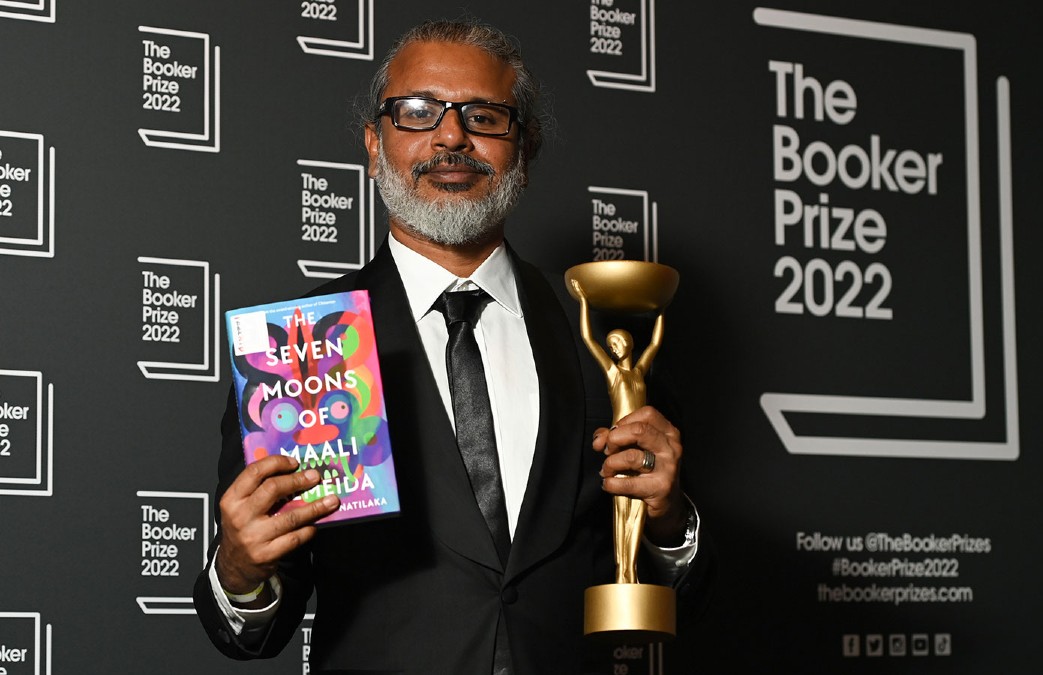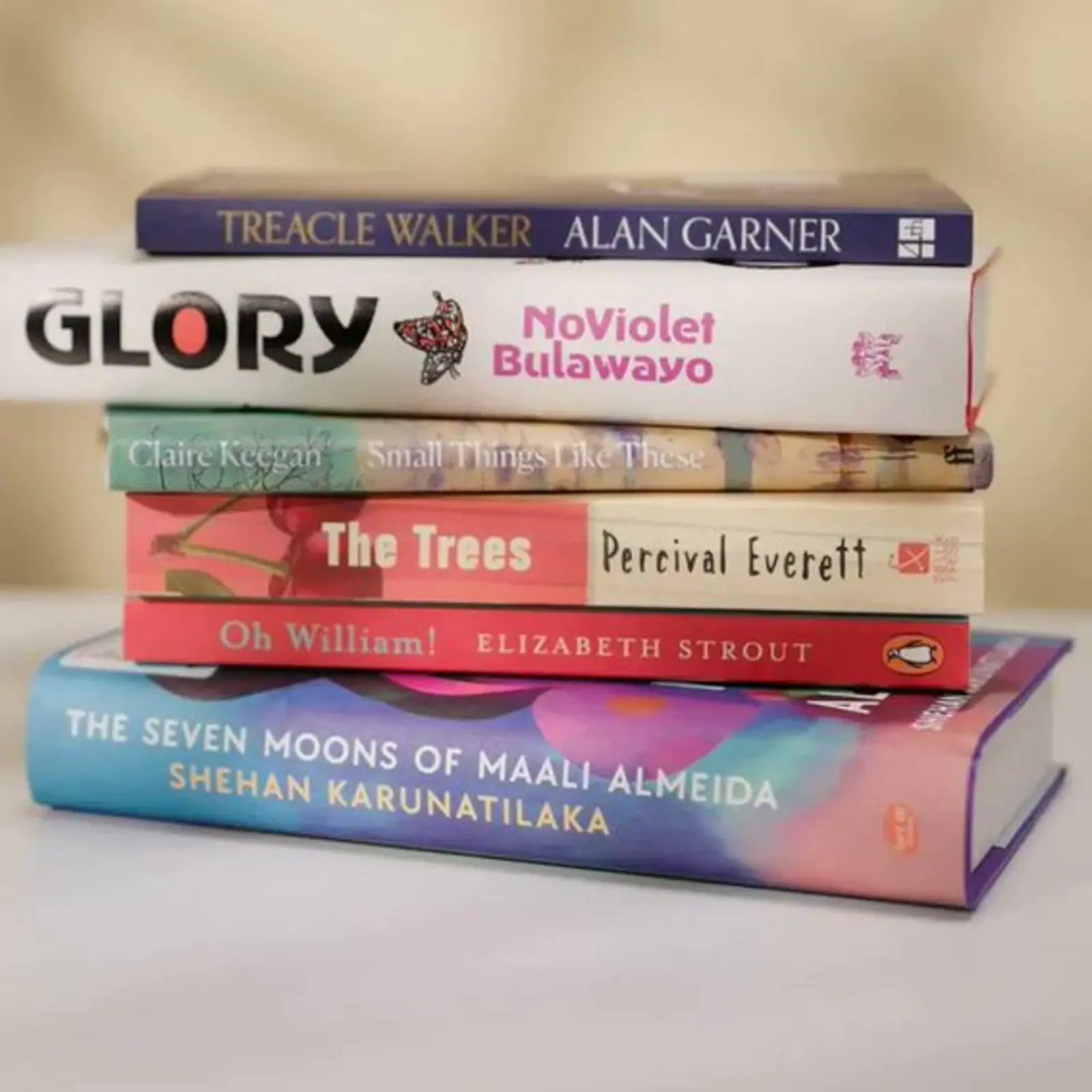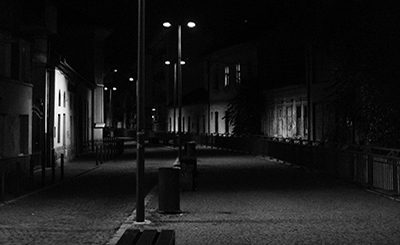
Shehan Karunatilaka at the Booker Prize ceremony in London. Photo: Kate Green/Getty Images
The qualifying differences of Shehan Karunatilaka’s The Seven Moons of Maali Almeida, compared to the other five books concerning various literary aspects, were pronounced
I ‘predicted’ the Booker Prize 2022! Well, that’s what my friends say. Following the announcement of the Booker shortlist this year, I read all six books on the list and shared the observation that The Seven Moons of Maali Almeida by Shehan Karunatilaka might win this year with my book-loving friends. And when the winner was declared a couple of days later, my friends congratulated me with much incredulity for ‘predicting’ the winner exactly. Some even went to the extent of jokingly calling me ‘Mr. Nostradamus.’
The truth is that the so-called predictions are not a big thing. Predictions abound. Some predict the winner of elections, while others, which horse would win the race. Someone else would be predicting the team that would win the football tournament. Many think predictions are supernatural and require some special powers or ESP. I think people predicting things correctly do so with the help of adequate information and appropriate analysis of it. A football-crazy man must have been observing past years’ matches closely. When he subjects the statistics to a bit of analysis based on common sense and critical evaluation, he arrives at the most probable result. My ‘prediction’ was no different. I’ve written this piece to demystify the process of prediction. I believe anybody who read the six shortlisted books for this year’s Booker carefully could have easily predicted the winner.
My methodology involved grouping the six books into three categories based on their themes or certain prominent characteristics. Thereafter, I compared and evaluated the books in each of the three groups, eventually eliminating some of them and only keeping one in each group. Then these three books were compared and evaluated again, and two of them were removed to finally arrive at the winning title of the Booker Prize 2022. That said, I also saw online some people’s predictions going wrong and I guess that’s because their evaluation might not have been objective, impartial, and based on the technicalities. Instead, they could have been naming the book they enjoyed as the potential winner.

Here are the six Booker shortlisted books of 2022:
1. Treacle Walker by Alan Garner
2. The Seven Moons of Maali Almeida by Shehan Karunatilaka
3. The Trees by Percival Everett
4. Oh William! by Elizabeth Strout
5. Glory by NoViolet Bulawayo
6. Small Things Like These by Claire Keegan
As mentioned earlier, the shortlisted books can now be roughly grouped into three based on their prominent characteristics or the nature of their plots and themes.
One group only has a single occupant, Treacle Walker by Alan Garner, which sets itself apart from all other titles in the shortlist for the sprightliness of its language.
The second group consists of three books, namely The Seven Moons of Maali Almeida, The Trees, and Glory. All three have political, social, ethnic, or racial conflicts and disturbances in some countries as the main theme of their plots.
And the third group is occupied by two titles, Small Things Like These and Oh William!. The common characteristic feature of these two works is the warmth of family and personal relationships at their centre.
Now, the above sub-categorization makes the elimination process easier, because, out of the three books in the third group, you can select the one that’s the best. Similarly, from the group having two books, you can select the better one. Thus, you will be left with one book each from every group, which reduces the total number of the shortlisted titles from six to three, which will be our ‘short-shortlist’. Once we have the short-shortlist, our job is to compare the three contenders on it and evaluate their merits concerning different qualities to eliminate two of them and arrive at the winner. So let’s go!
Treacle Walker by Alan Garner
Firstly, let us consider Treacle Walker by Alan Garner. This is a small book revolving around the friendship between an elder man who is a healer and a little boy, Joe, whose one eye is weak. There is no grand story or extraordinary plot. The story is almost non-existent, so to speak, and the plot is nothing that warrants your undivided focus to comprehend or enjoy the work. Instead, the sheer exuberance of language is the single best thing about it, and it makes the book stand out from the rest of the titles. The vibrant words conjure up a mysterious realm of fantasy that you are not used to, filled with magic and unconventional motifs, with the help of elements from folklore, myths, and surrealistic imagination. You will find vernacular language and many funny and strange words like ‘hurlothrumbo’ and ‘lomperhomock’. Different times blend with each other seamlessly. As mentioned on the Booker website itself, time is fluidic here. You never know when you switch from one time to another. Spaces mix too, and the real world at times looks magical and no different from the ones in the comics Joe the little boy reads. It's a marvellous jumble of many different worlds. Thus, this little, quaint fable is the sole title of this group with no rival because no other of the six books has that kind of charisma of words.
So, now our short-shortlist has one sure title, Treacle Walker by Alan Garner.
Now, we move on to the second group, which has three books, all of which have social and political disturbances, civil war, or communal strife as their dominant themes. Let’s consider them one by one.
Shehan Karunatilaka’s The Seven Moons of Maali Almeida
Shehan Karunatilaka’s The Seven Moons of Maali Almeida is an interesting story narrated against the backdrop of the rift among the Tamil and the Sinhalese communities and the civil war in the Sri Lanka of the eighties. It utilizes several possibilities of fiction effectively. The narrator is the war photographer Maali Almeida’s ghost who couldn’t recollect how he died or who killed him and is on a quest to find this out. He has a box of photographs hidden somewhere, which are no less than bombs and powerful enough to topple governments. Being a ghost story presents the possibilities of two different worlds — the one of the living and the other of the dead — and how Maali views them.
Maali is also gay and a crazy gambler, which gives further possibilities to enhance the quality of fiction. The gay element is relevant in today’s world of Queer activism, and Maali’s being a gambler creates a lot of room in the story for his strange tendency to weigh the odds of any outcome in real-life situations, and gambling and poker terminologies merge with ordinary conversations. The strife in the war-torn country is not just between two ethnic groups; there are also other political divisions like the JVP and the UNP, and interferences of the Special Task Force, the Indian Peace Keeping Force, the UN, intelligence agencies like RAW and CIA, and many others. The author has to consider the effects of these entities and their dynamics at work towards each other.
The Trees by Percival Everett
Like The Seven Moons…, Percival Everett’s The Trees is also about the conflicts and rivalry of two racial groups in a country. This is a book that draws heavily from the history of Black lynching in the United States of America in the last hundred years, with a special emphasis on the notorious 1955 incident of Emmett Till, a Black teenager in Mississippi who was brutally tortured and murdered by the White Bryant family. Some of the Bryant family members, including some who are still alive, appear as characters in this novel. The story has a group of vindictive Blacks set out to settle accounts with the White supremacists. There is a series of killings executed in the same fashion, starting from Mississippi and gradually spreading to other states, and eventually terrorizing the entire country. And many investigative agencies, local as well as higher ones, including the FBI, are after the culprits from the beginning to the end of the book to resolve the mystery of the murders and the missing bodies. It is a brilliantly written book that keeps the reader riveted until the end; though it presents events of a repetitive nature throughout, there is no dull moment.
Glory by NoViolet Bulawayo
The third book in this group is Glory by NoViolet Bulawayo, which is also a novel with a political framework like the
above two. Here, the country is Zimbabwe, and the story is an allegory of the country’s late president Robert Mugabe’s rule, his fall, and other associated events. It portrays the corruption and tyranny under the rule by drawing the picture of an imaginary country named Jidada whose citizens are animals instead of humans, having been inspired by George Orwell’s Animal Farm. The Jidadan president, the Father of the Nation, is an old horse. The language of the book is simple yet powerful. The book elaborates on the despotic rule of Zimbabwe in the last few decades and its genocide called ‘Gukurahundi’ vividly.
Having evaluated the three books in the group separately and independently, now let us compare the three and find out which the best of them is and why. A simple glance can easily reveal the merits of each one of them, making it easy for you to compare the three. Here we go!
The satire Glory is clearly a book with a mission. It has chronicled a certain historical episode of a nation for the whole world to examine and ponder on through the medium and using the tools of fiction. However, compared to the other two works similarly based on socio-political themes, it falls short on several counts. Perhaps a major difference between this novel and the other two is that while those two have distinct fictional stories superimposed on the real political and social scenario of two nations respectively, in Glory you find that the political situation of the nation, along with its turbulences and crises, is itself more or less the story. There is not much of another fictional narrative to attach to that framework or to combine with the events associated with it. The author is mostly documenting certain events of history which have already occurred and doesn’t need as much imagining to conjure up those situations as in the other two books. She only has to recreate them, which is an activity very close to non-fiction. In fact, her initial plan was to write a work of nonfiction on the subject before she changed her mind to present it as this satire.
The single most important fictional element in the book is perhaps that the characters are animals rather than humans. However, there too, the fictional possibilities explored are minimal. Other than replacing humans with animals, there is nothing much done. For instance, if the book says, “The car doors opened... and the Father of the Nation emerged,” we know that it’s a horse that emerges from the car as he is the Father of the Nation. But there is nothing mentioned about the intricacies that take place when an animal travels by or emerges from a car. Instead, the animal is presented just like a human being. Remember, the Booker committee looks forward to discovering and celebrating the best of fiction, and the more fictional possibilities effectively employed in the book presented before them, the better. Compared to Glory, the other two books have much more fictional merits to count. As already mentioned, they both have an imagined story and a real environment on which the story is superimposed, while Glory merely has the latter element, only recreated fictitiously. Besides, it is devoid of the ingredient of suspense as it is only a narration of a string of events from history, while the other two books have a great deal of it which keeps the reader curious until the end. There are many more differences between Glory and those two books that could turn detrimental to the former as far as the Booker evaluation is concerned. While The Trees and The Seven Moons… have shown so many ways for the Booker jury to evaluate them, Glory has fewer alternatives to prove its worth.
It means that we drop Glory and are left with The Trees and The Seven Moons… in the group. These two titles are, undoubtedly, two tough contenders and must have given the Booker committee a hard time in deciding which one was better than the other. On their surface, both these books have a lot of elements in common, including several similarities in the themes. The backdrops in both books are those of two opposing ethnicities or races of some nation pitted against each other. Both handle national issues that have a direct bearing on the masses of their respective countries. Also, overlaying all other constituents of the plots in both is a trail of investigation.
Both have murders and missing bodies and police officers and investigation teams in search of the perpetrators and disappearing people or bodies from the beginning to the end. And even though both stories stink heavily of death and homicide, subjects not that suitable for a laugh, both narratives decide to deal with them with a pinch of humour instead of making them look altogether horrendous. And you must be adequately skillful and deft and a bit innovative to do that, with topics that are grim and serious and not naturally conducive to humour, especially with such fast-paced plots. The authors of both these books have structured their works masterfully and presented them with much perfection.
Even in the case of a certain alleged non-literary benefit, one could easily place both works on an equal footing. What I am alluding to is the attention garnered by the subjects of these two books in recent times, which makes them unignorable to both the Booker jury and the readers. The atrocities and crimes against Blacks in America gained international attention more than ever with the George Floyd incident that made the headlines a couple of years ago. Similarly, the political turmoil in Sri Lanka that took place a few months ago in which its president Gotabaya Rajapaksa had to flee, temporarily leaving the country in a state of anarchy, has put the country too on the international news headlines. In other words, there is the factor of time playing an inevitable role here and the relevance of the themes of these books to our times could have helped them gain some added significance. It’s the right time for these books to be published and one could presume that it must also have been a significant reason that made these titles gain enough attention and enter the Booker shortlist, or even the longlist itself. Even Glory shares this benefit; however, as we have seen already, it had to be eliminated for other reasons mentioned earlier.
Despite the above similarities between the two books, The Seven Moons… is still at a significant advantage compared to The Trees, as it still possesses many additional qualities compared to the latter that are capable of keeping it a step ahead and elevating it in terms of overall merits. Let’s now look at them briefly. As mentioned earlier, Booker looks at the fictional value of the works, and the more the work is fictionally dense, the better. The Seven Moons… has several fictional embellishments to it in addition to what it shares with The Trees. For instance, the protagonist Maali Almeida is a professional war photographer, which turns out to be a marvellous excuse to expose the reader to the risky world of that job, including factors like the political interferences and threats the photographers have to face, the jeopardy of being present in the middle of destructive mayhem, the intricacies of the profession especially concerning the differences from normal photography, and the learnedness of such photographers about political issues of global impact and world histories. The book portrays with clarity how a photojournalist views a world in turmoil, with all the hostilities driven by political ideologies and nationalistic bigotries.
Another element is the fact that Maali is also gay, bisexual to be precise, with a girlfriend, which also inserts adequate room to ponder many issues of romance, personal relationships, sex, sexuality, and gender, which are hot and relevant topics in these times of the Pride movement and Queer talk. Yet another enhancement to Shehan's fiction is the fact that Maali is also a gambler who has lost and won huge amounts of money in the game. He is so obsessed with the gambling world and games of chances that he keeps calculating the odds of an event occurring or not at every step of his life even when he’s out of the casino. Thus, gambling overflows from betting houses into his life and pervades every aspect of it. He even talks about ordinary things using terms and metaphors of gambling. That’s not all; the ultimate thing about Maali and the book is that he is a ghost who is unaware of how he died and is on a quest to sort out the mystery. This fact again contributes another valuable facet to the story. You deal with concepts of life and death and ponder on them and get to see two worlds — one of the living and the other of the dead — juxtaposed against each other. There is also a strong presence of religious beliefs and superstitions. What’s more, you get to see how a ghost views these two worlds and the complexities involved in an existence teetering on the border between them.
Thus, Maali is not one person. He is so many diverse personalities rolled into one. He, and the stories surrounding him are complex and exist across different layers. Is that all? No! The narration has got something different and special. Most books are narrated in the first person where the protagonist talks to you, or in the third person where a narrator talks to you about the protagonist. However, The Seven Moons… is a “first-person narrative written in the second-person” in which one part of the ghost of Maali narrates the story to another part of him. Because, when Maali died, he turned into a ghost of several components. And the story is narrated by one of the components to another, instead of narrating to the reader.
The Trees can hardly claim to have employed such a broad range of fictional devices, plot enhancements, or multiplicity of themes interlaced with one another. Besides, though both books have a fictional story against a historical reality in them, in The Trees, the fictional part is also rooted in the same subject as the real part, while The Seven Moons… has a story separate from the historical background. It implied an additional opportunity for the author to prove his ability to reconcile two contrasting worlds, which he did remarkably well indeed.
In short, while The Trees always stays firmly glued to its core idea and follows the plot in a straightforward manner, in The Seven Moons…, you see the plot meandering around many different places and encompassing multifarious ideas, giving more challenges to the author in his art, thereby allowing him an opportunity to tackle them successfully and prove his worth. An additional point to consider is the attention both countries garnered on an international level in recent times for socio-political reasons, as mentioned earlier. In that matter, too, The Seven Moons… must have got a head-start. While the information on racism in America may not be unfamiliar to the West, the ethnopolitical disturbances and its history in the Eastern country of Sri Lanka must have held some ‘exotic’ appeal to the prize from a Western country.
Thus, we need to eliminate The Trees too from the group and are left with just The Seven Moons… in it. Thus, our short-shortlist now has two books, Treacle Walker and The Seven Moons of Maali Almeida.
Now coming to the third group, we have two books to evaluate: Small Things Like These by Claire Keegan and Oh William! by Elizabeth Strout.
A prominent theme in both these books is the warmth of family and intimate relationships. In Oh William!, an elder lady, Lucy Barton, reminisces about her times with her ex-husband and several others in her life. The style of narration is like someone talking to the reader one-on-one and informally, sitting close by. And the extremely simple language employed perfectly suits that style. It seeks to convey to the readers the complexities of relationships and the intricacies of life and make you realise how people close to you are farther away from you than you think and vice versa. And sometimes, the more you want to comprehend the character of a person in your life, the more profound an enigma you find them to be. The book also has an underlying theme of deep loneliness.
Small Things Like vs Oh William!
Small Things Like These has a story from the eighties surrounding a family consisting of the couple Bill Furlong and Eileen and their five girls in the small Irish town of New Ross. In the background are days nearing Christmas and people’s lives affected by an economic depression. Bill is a coal and timber merchant and manages to get by fairly well even during the crisis. However, he soon discovers something unpleasant around the place that starts gnawing at his thoughts day and night although it doesn’t have a direct bearing on him or his family. Instead, it has something to do with a stigma that existed in Irish society.
As mentioned already, both these evocative books have the warmth of family and relationships at their centre and are written in simple language. While that simplicity complements Oh William! perfectly in that it is a narration meant to be a direct and informal conversation of Lucy to the reader, it holds the risk of the narrative looking too traditional and devoid of style or innovativeness for Small Things Like These. Even the story of Small Things… could look trite with apparently cliched tropes to many and from any angle, a whole lot superficial, while Oh William!, in its unhurried pace, attempts to explore the depths and meaning of human relationships. While Small Things… apparently never bothers about style, in Oh William!, you find scattered attempts to enhance the style, which makes the simplicity of narration a bit more attractive instead of leaving it totally bland.

Perhaps the only merit at which Small Things… can outweigh Oh William! is that it urges the reader to look at a social issue that questions the integrity of Irish society in the way it treats a certain community of women. This point could even make the novelette look similar to the three books discussed earlier that handled socio-political issues. However, in this, the social issue and the family story remains separate and cut off from each other for the most part. Which means that there is little effort in merging the two themes of fiction and reality, unlike the other books, at least the way they did it.
Many readers even miss the point and remain unaware that the story is talking about a social issue even after the story ends unless they read the afterword wherein relevant information on the matter is briefly presented. However, one cannot deny the fact that the denouement makes it a feel-good story. That said, weighing the above factors, one could easily see that it is Oh William! that manages to achieve more literarily, which eliminates Small Things Like These from this group.
That makes the creation of our ‘short-shortlist’ complete with the three following books:
• Treacle Walker by Alan Garner
• The Seven Moons of Maali Almeida by Shehan Karunatilaka
• Oh William! by Elizabeth Strout
Now, this is the list of three contenders we have of which we must pick the final winner. And we do not need as much work for that as in the previous stages, as by now we are very clear about the merits and demerits of these books. Still, a brief few words are necessary.
About Treacle Walker, you can say that whatever has been presented in the book has been presented perfectly and utterly confidently. And perhaps no other book on the shortlist can claim that as much as this little gem. However, as mentioned already, it has not employed as many tools of fiction as some other books on the shortlist to prove the excellence of craft in multiple capacities. Concerning this factor, Oh William! is no different. Thus, these two works fail to weigh enough vis-a-vis The Seven Moons… Apart from the evaluation based on the fictional value of these works, The Seven Moons... also turns a winner when it comes to dealing with the realities of an entire society on a large canvas.
Treacle Walker can be read for fun, and you can enjoy it for its vibrancy and vitality. Apparently, it doesn’t have any bigger mission to accomplish. Oh William! goes a step further and attempts to explore the truths and intricacies of human relationships. However, it doesn’t do it using a large frame either. It’s about a few individuals and not a wider humanity. Though it might provide you with some insights into individual human relationships, it is unlike The Seven Moons… which addresses broader issues of communities in a certain society and humanity as a whole.
While The Seven Moons… has a rich fictional side with a generous deployment of multiple plot devices; it also has a component of stark realities that took place in the history of a country in the background. In other words, besides narrating an exciting story, it also unfurls before the world the grim truths of a nation. Thus, despite being a work of fiction, it also serves as a vehicle for some sort of service to humanity. And the dexterous juggling of the two worlds with all their dazzling as well as pale colours, and their flawless blending — done splendidly — elevate The Seven Moons of Maali Almeida much higher than the other two on our short-shortlist.
Thus, we again make a round of elimination and remove two titles from the short-shortlist to be left with just one — the Booker Prize winner of 2022, which is The Seven Moons of Maali Almeida.
I guess, by now you know how simple it was for anyone who read the six books and subjected them to a bit of critical evaluation to guess the winner and that it was not much of a prediction. It’s all about reading the Booker jury’s mind and thinking the way they think so that you know what they are looking for in these books. In other words, as Rushdie said, it’s about getting under their skin and looking out through their eyes to view the world as they view it. And the exercise was not hard this time because the qualifying differences of The Seven Moons of Maali Almeida compared to the other works concerning various literary aspects were so pronounced.
More from The Byword
Comments
*Comments will be moderated
Harris, your life moulded and pressed your literary prowess to come out in flying colors.Way to go dear friend.God bless you.
Jayesh Vijayan
Nov 16, 2022 at 13:43











